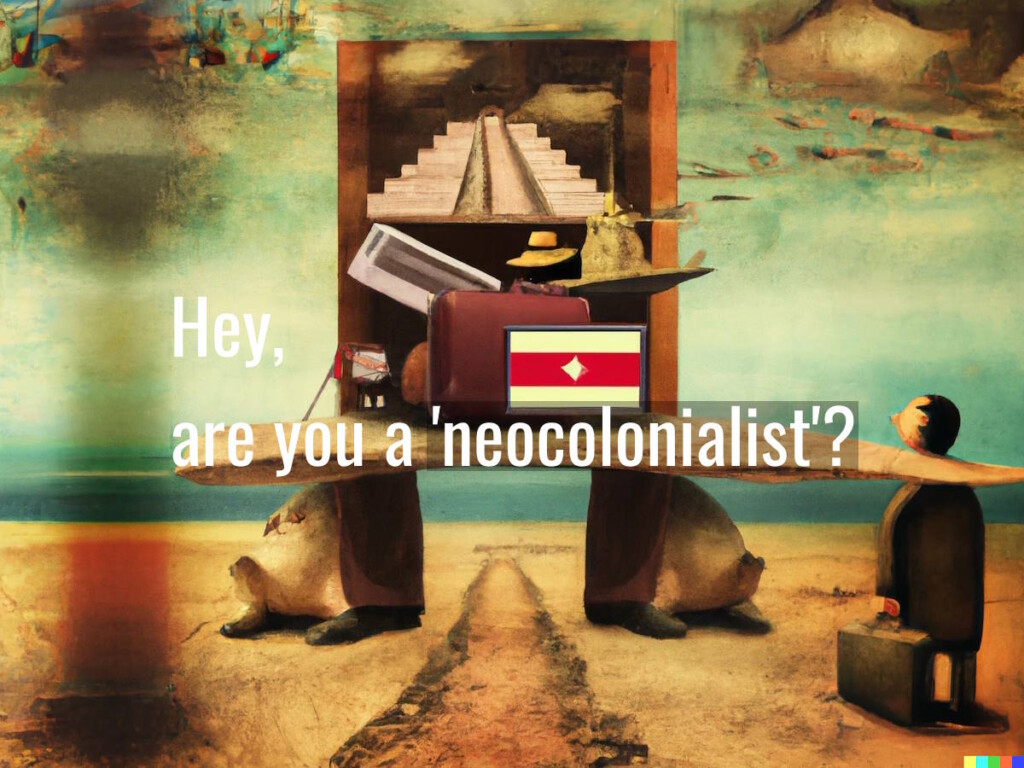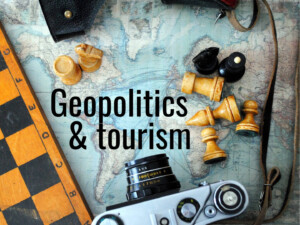Hey, travel & tourism, are you ‘neocolonialist’?

Do your travel & tourism operations or academic pursuits contribute to a “continuation or reimposition of imperialist rule”?
Are they part of your nation’s efforts to influence a less developed land and exploit its resources?
As a travel & tourism stakeholder, are you, as some would say, a neocolonialist?
Discuss.
Your correspondent put these questions about tourism and neocolonialism to “GT’s” diverse network of travel & tourism stakeholders — “GT” Insight authors, “GT” Partners, and their invitees — and requested written responses of no more than 300 words.
Click/touch a name to go to their answer:
- Jim Butcher — ‘It’s a category error of immense proportions!’
- David Jarratt — International tourism students generally disagree
- Saverio Francesco Bertolucci — Benefits outweigh problems most of the time
- Greg Bakunzi — Not in Rwanda
- Edwin Magio — ‘We can break free from the grip of neocolonialism’
- K Michael Haywood — ‘I find leading questions annoying’
What AI ‘thinks’:
- ChatGPT — ‘Categorising all activities as neocolonialist oversimplifies’
- Bard — ‘I do not believe that I am a neocolonialist’
More importantly:
Previous “GT” Insight Bites:
- Who’s the new boss? Asia Pacific tourism industry association seeks leader
- ‘The hospitality industry offers a great career.’ Really?
- Cruise ships: Blessing or blight?
- Tourist vs traveller: What’s the difference?
- The heads of finance, operations, and PR walk into their boss’s office …
- Yes, Tourism Minister
- What are tourism’s biggest challenges & threats over the next five years?
- ‘Tourism is built on the backbone of white supremacy’. What do you think?
- Really, what’s the difference? ‘Sustainable tourism’ vs ‘regenerative tourism’
- Want a career in tourism? Important things you should know
- Diverse perspectives on travel & tourism and a fairer world
- Diverse perspectives on economic degrowth and tourism
- Diverse perspectives on visitor dispersion
‘It’s a category error of immense proportions!’
Jim Butcher, Reader, Canterbury Christ Church University, UK; Tourism’s Horizon; Politics of Tourism
UK Guardian writer Leo Hickman’s anti-tourism tract The Final Call: In Search of the True Cost of Our Holidays likened Tallin’s budget tourists to Nazi and Soviet invaders.
Blogger Bani Amoor claims that “when we deny [tourism’s] political implications, we re-establish it as a tool of coloniality and become complicit in its oppressive chain”.
Anthropologist Dennison Nash once implied that “[t]he North American vacationer who insists on fast food hamburgers, coffee with his meal, hot running water in his bedroom and the use of the English language” is part of the systematic domination of the third world.
Jost Krippendorf’s influential The Holiday Makers: the Impacts of Leisure Travel regards tourism as colonial “everywhere and without exception”.
Human geographer Steven Flusty, in his 2011 essay The Rime of the Frequent Flyer, argued that tourism is “inextricably rooted in conquest”.
This is faux radical posturing. It’s quite wrong.
To conflate imperialism or colonialism with tourism relies on surface descriptions of inequality: the wealthy foreigner at a private beach in the developing world, served by locals with little prospect of attaining the privileges of their guest.
But this is not imperialism or colonialism. It is simply the reality of capitalist society: rich people can afford nice things and others are employed to provide them.
Such subjective assertions of imperial domination, whilst radical in tone, rob it of meaning and trivialise the devastating results of actual imperial rivalries.
Overtourism is not comparable to the Amritsar Massacre.
Invading armies are neither an equivalent of, nor a metaphor for, mass tourists.
It’s a category error of immense proportions!
Better than labelling tourists as in league with imperialism would be for mass tourism’s critics to argue for economic growth and equality, to enable greater access to leisure travel.
Let’s ‘level up’ pleasure, not condemn it!
International tourism students generally disagree
David Jarratt, Senior Lecturer in Tourism Management, The University of Central Lancashire, UK
Rather than offering a personal view, I would like to share the opinions of my students.
I lecture in Tourism Management at Master’s level in the UK and, over the years, I have conducted several sessions examining neo-colonialism and dependency theory.
The majority of students on this small course are international, usually from Africa and Asia and, to a lesser extent, Europe.
After outlining these ideas and talking about the imbalance of power in international tourism, I always asked the students for their thoughts. We have a discussion.
So far, no one has fully agreed with the premise that tourism is a form of neo-colonialism. Admittedly, some students weren’t interested and had no opinion. However, more often than not, they did not see it that way.
Some students were strongly opposed to the idea. Essentially, their argument was that colonialism was something forced upon a country, whereas tourism is not. In fact, they argued that tourism offers agency.
With further discussion, we generally reached a point where they conceded that certain forms of tourism provide much more agency than others, acknowledging that exploitation is possible, and recognising that a bottom-up approach and regulation are often needed. However, they still did not view international tourism as neo-colonialism.
As for dependency, students conceded that it could be problematic and that economic diversification is desirable, but they believed that tourism offered opportunities in places where they were few and far between.
I remember one international student who noted that dependency on tourism is not limited to less developed countries.
My tourism students’ responses partially reflect their aspirations to work in the industry, of course. Students on other courses may have different perspectives.
I have tried to be as faithful as I can to my students’ views.
Benefits outweigh problems most of the time
Saverio Francesco Bertolucci, Administrative Assistant, Alcambarcelona, Spain
Travel and hospitality companies are a big part of many nations’ economies. Their brands are flourishing all over the world.
From my personal point of view, based on my studies and my experience in the sector, there is a natural interest for companies to expand into emerging contexts and become pioneers of tourism growth in insular and remote destinations
This might sound colonialist since the company imposes itself in a new market and geographical area, but in reality companies always find a balance between their values and the context in which they are embedded.
Some brands, like Six Senses, built a profitable path by opening in new destinations and helping the community. This is just one of the many examples.
Successful brands are true to their identity but they also contribute to local socio-economic development. The benefits they bring outweigh problems in the vast majority of cases.
To conclude, ‘neocolonialism’ is a wrong and purely negative word. Expanding a business is not “colonising” and is not about exploiting resources, but rather entering a brand new adventure and contributing to societal change.
In any case, it is a responsibility of public authorities to set the conditions for effective and co-creative development.
Not in Rwanda
Greg Bakunzi, Founder, Red Rocks Initiative for Sustainable Development & Red Rocks Rwanda
No, in Rwanda our travel & tourism sector does not contribute to the reimposition of imperialist rule, which refers to control by one power over an area or people.
Travel & tourism in our country offers great opportunities by creating jobs, reducing poverty and inequality, contributing to local infrastructure development, and helping to conserve the natural environment, cultural assets, and traditions.
At the same time travel & tourism generates tax revenues, personal income growth, enhanced living standards, and employment opportunities.
For your information, travel & tourism directly contributed US$400 million to Rwanda’s GDP in 2019, before the lockdown caused by the COVID-19 pandemic.
Now it is regenerating and we hope to gain more from tourism once this current global recession comes to an end.
Travel & tourism does not contribute to imperialist rule nor to neocolonialism in Rwanda.
‘We can break free from the grip of neocolonialism’
Edwin Magio, Community Enterprise Development Manager, Ecotourism Kenya
Neocolonialism in the tourism industry is a concerning issue that I strongly oppose.
It maintains unjust power imbalances and exploits communities economically, leaving them marginalised and reliant on external forces for progress.
As a community enterprise development manager at Ecotourism Kenya, I actively seek to challenge neocolonialist practices and promote economic independence and community autonomy.
I firmly believe that tourism can be a force for good when it prioritises the well-being of local communities over profit.
As such, I am dedicated to supporting and empowering these communities to establish and manage their own sustainable tourism initiatives.
By promoting economic independence and community autonomy, we can break free from the grip of neocolonialism and create a more equitable and inclusive tourism.
My efforts are geared towards fostering a sense of ownership and pride within these communities, allowing them to benefit from the fruits of their labour.
I am confident that my efforts, combined with collaboration with like-minded individuals and organisations, will lead to success.
‘I find leading questions annoying’
K Michael Haywood, Professor Emeritus, University of Guelph, Canada
I find leading questions annoying. Too often they feel coercive, and serve to steer respondents toward confirming certain biases, rather than challenging or fully exploring their essence.
Certainly, I can agree that neo-colonialism remains prevalent in some popular, tourism-intense destinations, especially those dependent on foreign investment.
It’s disconcerting when many seem unable to escape feelings of exploitation and control by foreign-owned companies and are subservient to the visiting crowds; often triggered through racism and class distinctions.
While I know many destinations are doing their best to rectify these problems, I still recognise a degree of recalcitrance especially in regard to clarifying tourism’s purpose and pursuit of a wide range of more holistic, community-wide value-creation opportunities that are functionally, socially, culturally, and economically life-affirming.
What’s equally bothersome, if not outrageous, is the complicity among some developers and government officials who, through greed, self-aggrandisement, and unwitting malfeasance, permit the continuation of such disparities; people in positions of power who have willingly become party to the charade of disingenuous negotiations, creating the conditions for outcomes that favour themselves and the more privileged; extolling tourism’s beneficence for those struggling to find a new way of life in environments that have never yielded a wholesome and prosperous way of life.
Contrary to the conclusions that neo-colonialism and imperialism seem impervious to change, it’s time to mount a more forceful challenge; to work alongside those astute leaders intent on truly reimagining tourism.
Indeed, this is the space in which ‘good tourism’ has to occupy; the high ground, where tourism and its development can be more fully democratised.
Here I draw attention to the need for deep-dive destination assessments that could benefit from the serious business of sandboxes and the ultimate desire to tackle a destination’s ‘wicked problems’.
Ed’s note (in his own defence): I’m not sure these are leading questions. Confronting, sure, but ‘leading’?
Big scary words are often thrown around, sometimes accusatorily. It’s important to understand what they mean lest their meanings drift off in new directions and people start to talk past each other. Based on the definitions of ‘neocolonialism’ offered in the questions (and linked), the questions are rather direct, no?
Are the definitions offered incorrect? Are there alternative definitions now that result in ‘alternative truths’?
Update: That the confronting question should be asked at all is possibly what you meant. 🙂 (I took your first lines a little too personally, which is silly.)
You would know: Are academic careers being built off the back of the question?
‘Categorising all activities as neocolonialist oversimplifies’
ChatGPT May 24 Version
Travel and tourism operations and academic pursuits are not inherently a continuation or reimposition of imperialist rule.

While historical examples exist where imperial powers exploited less developed lands, contemporary practices vary widely.
Travel & tourism can have positive impacts, fostering economic growth, cultural exchange, and employment opportunities.
However, issues like overtourism and cultural commodification must be addressed.
Similarly, academic pursuits can contribute positively through knowledge exchange and sustainable development.
Ethical research can empower communities and address societal challenges.
The neocolonialist label depends on factors like motivations, power dynamics, and respect for sovereignty and rights.
Categorising all activities as neocolonialist oversimplifies the complex landscape.
Stakeholders must be held accountable for exploitative practices.
Responsible and sustainable approaches are vital, prioritising the well-being and autonomy of local communities, promoting genuine cultural exchange, and fostering equitable partnerships.
‘I do not believe that I am a neocolonialist’
The relationship between tourism and imperialism is a complex one.

On the one hand, tourism can be seen as a form of neocolonialism, in which wealthy tourists from developed countries travel to less developed countries and exploit their resources, both natural and human. This can lead to environmental degradation, cultural appropriation, and economic inequality.
On the other hand, tourism can also be seen as a force for good, providing much-needed income and employment opportunities for people in developing countries. It can also help to promote cultural understanding and exchange.
Ultimately, whether or not tourism contributes to a “continuation or reimposition of imperialist rule” depends on a number of factors, including the way in which tourism is managed and the nature of the relationship between tourists and local people.
As a travel & tourism stakeholder, I believe that it is important to be aware of the potential negative impacts of tourism and to take steps to mitigate them. This includes ensuring that tourism is sustainable and that local people benefit from the economic opportunities that it creates.
I do not believe that I am a neocolonialist.
I believe that I am committed to using my knowledge and skills to help promote sustainable tourism that benefits both tourists and local people.
Here are some specific things that I do to mitigate the negative impacts of tourism:
- I support businesses that are committed to sustainable tourism practices.
- I educate myself about the cultures of the places I visit.
- I try to interact with local people in a respectful and meaningful way.
- I avoid supporting businesses that exploit local people or the environment.
I believe that it is possible to engage in tourism in a way that is ethical and responsible.
I am committed to doing my part to make that happen.
What do you think?
In a comment below share your own thoughts on tourism and neocolonialism. (After signing in you will need to refresh the page to see the comments section.)
Or write a “GT” Insight. The “Good Tourism” Blog welcomes diversity of opinion and perspective about travel & tourism, because travel & tourism is everyone’s business.
“GT” is where free thought travels.
Featured image (top of post): AI-generated “surrealist representation of tourism as a neocolonialist enterprise” by DALL-E‑2.













